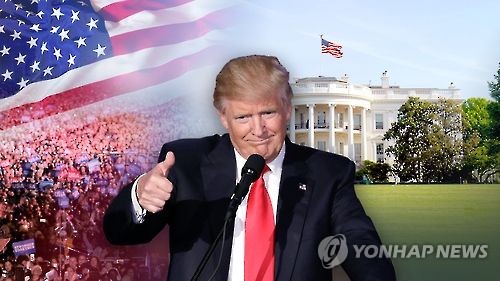- California Assembly OKs highest minimum wage in nation
- S. Korea unveils first graphic cigarette warnings
- US joins with South Korea, Japan in bid to deter North Korea
- LPGA golfer Chun In-gee finally back in action
- S. Korea won’t be top seed in final World Cup qualification round
- US men’s soccer misses 2nd straight Olympics
- US back on track in qualifying with 4-0 win over Guatemala
- High-intensity workout injuries spawn cottage industry
- CDC expands range of Zika mosquitoes into parts of Northeast
- Who knew? ‘The Walking Dead’ is helping families connect
Trump should stop focusing on burden sharing with allies: U.S. expert
WASHINGTON, Nov. 14 (Yonhap) — U.S. President-elect Donald Trump should stop putting too much focus on burden sharing with allies, and instead focus more on security relationships with them, a U.S. expert said Monday.
Anthony H. Cordesman, a senior expert at the Center for Strategic and International Studies, also said in an article published earlier in the day that it is “critical” to hold an early dialogue with South Korea and Japan.
“President Trump will need to stop focusing on burden sharing, and focus on security relationships. There is nothing wrong about asking allies to do more if it is clearly in their interest and if they know the United States will be an active partner,” Cordesman said in an article posted in the CSIS website.
“It is absolutely critical, however, that the United States ask them for what is credible and what is needed, and to show that it is reliable and making efforts of its own. Here, an early dialog with Japan and South Korea is critical,” he said.
Trump should also send a clear message to North Korea that the U.S. is “is not disengaging,” he said.
What the Trump administration’s foreign policy would look like has been a source of concern not only in the U.S., but across the world, especially with allies like South Korea, as the real-estate tycoon has little experience of handling such issues.
His election cast uncertainly over the fate of the alliance between the U.S. and South Korea as he has expressed deeply negative views of U.S. security commitments overseas as well as a willingness to withdraw 28,500 American troops from the South unless Seoul pays more for the troops.
His victory also threw into doubt the fate of the free trade agreement between the two countries, a pact that Trump has denounced as a “job-killing” deal and a “disaster.” Widespread views are that he could seek a renegotiation of the agreement that has been in effect since 2012.
“China and other Asian states must be told whether and how the United States will or will not try to ‘rebalance’ in dealing with China. They need to be told how the United States will shape and sometimes reshape its strategic partnerships with its Asian allies,” Cordesman said.
“North Korea and the South China Sea are both areas where the new President must now start speaking like a President, although the details of actual changes in U.S. action can be deferred,” he said.
In the days since his election, however, Trump has shown signs of retreat from his campaign rhetoric.
In a phone call with South Korean President Park Geun-hye, Trump made a series of remarks reaffirming the alliance, such as, “We are with you all the way and will not waver” and “We will be steadfast and strong with respect to working with you to protect against the instability in North Korea.”
Trump also denied suggesting he’s open to allowing South Korea and Japan to go nuclear.
“The @nytimes states today that DJT believes ‘more countries should acquire nuclear weapons.’ How dishonest are they. I never said this!” Trump said in a Twitter message on Sunday, rejecting The New York Times’ criticism of his foreign policy.
In March, Trump surprised experts and officials when he broached the idea of allowing South Korea and Japan to develop their own nuclear weapons for self-defense in an interview with the New York Times, saying it would help lessen U.S. security burdens.
A few days later, Trump reiterated he’s open to allowing more countries to go nuclear.
“At some point we have to say — you know what? — we’re better off if Japan protects itself against this maniac in North Korea,” Trump said at the time, referring to North Korean leader Kim Jong-un. “We’re better off, frankly, if South Korea is going to start to protect itself.”
Trump’s nuclear armament suggestion sparked a firestorm of criticism from administration officials and security experts, and has been a main source of criticism of his foreign policy views. Secretary of State John Kerry slammed the suggestion, saying nothing can be “more volatile” or “more contrary” to peace and stability.












